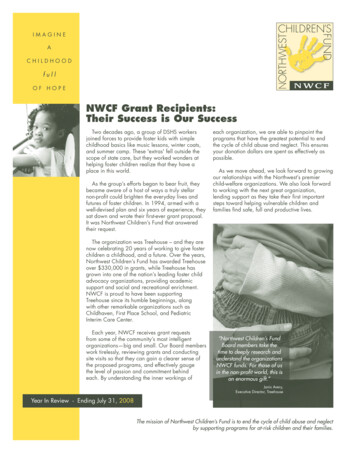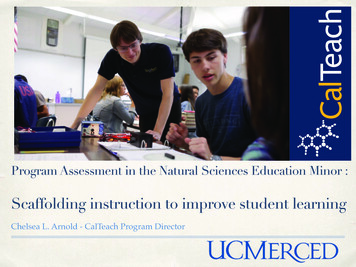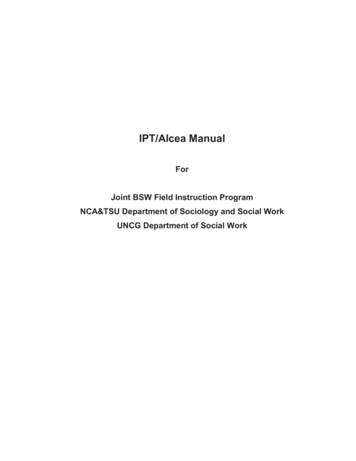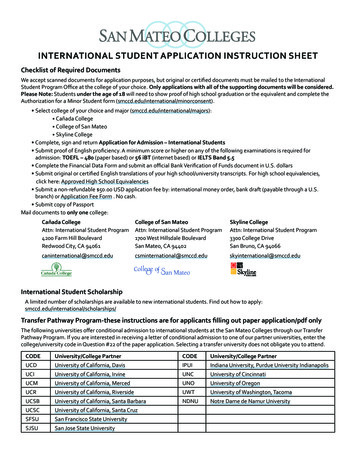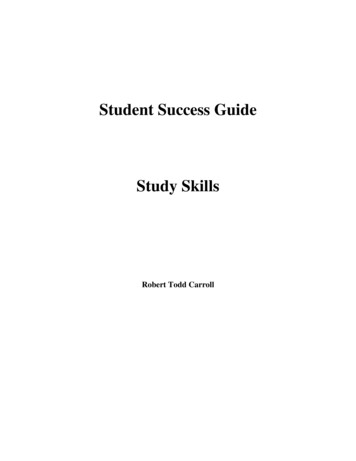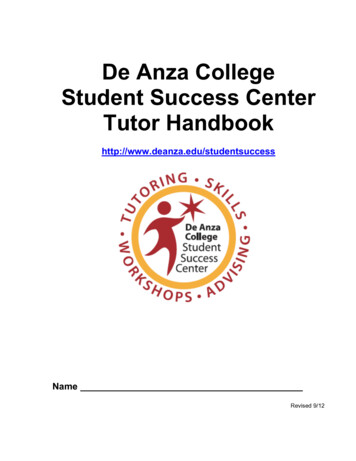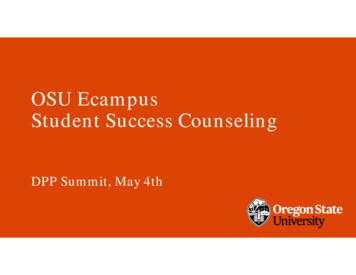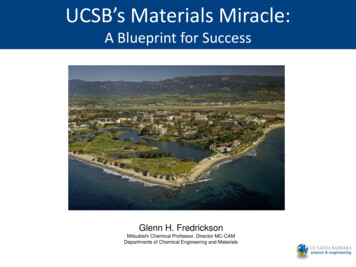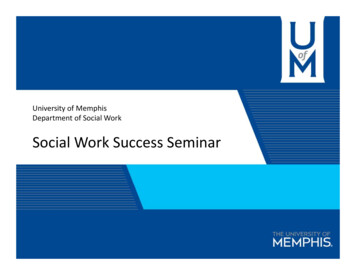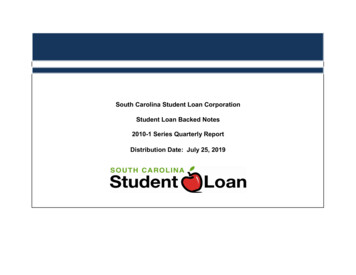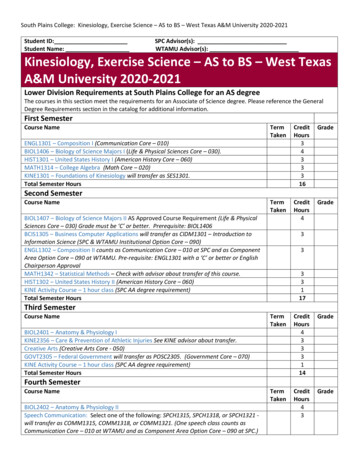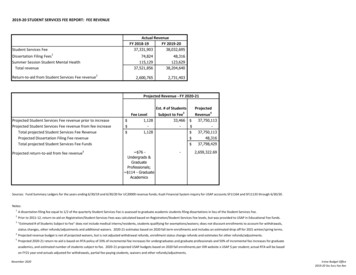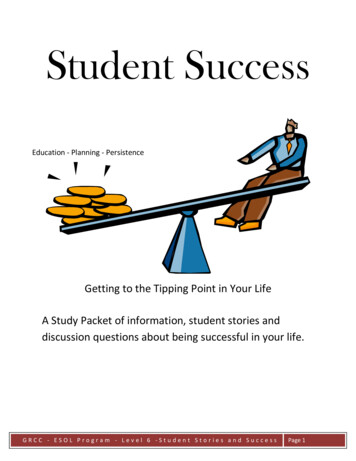
Transcription
Student SuccessEducation - Planning - PersistenceGetting to the Tipping Point in Your LifeA Study Packet of information, student stories anddiscussion questions about being successful in your life.GRCC - ESOL Program - Level 6 -Student Stories and SuccessPage 1
The Tipping PointA tipping point is like what you see on the cover of this packet. The man in the drawing is on ateeter totter. He needs enough weight on the other side to lift him up. Where there is enoughweight, he will be able to go higher. The teeter totter is like someone's life. That person canstay down with not enough English, not enough other education, and a low-paying job that hehates. In order to be lifted higher, a person needs to make some changes and get ahead.In 2005, the State of Washington studied students who came to its community colleges. TheState found out some very interesting information about success and education for students.Read these points and then read the student stories that follow. Then discuss these studentsand how they are on the way to building a better life for themselves. Then discuss your ownhopes and dreams. See the questions on the last page.Here are some of the important points from that study.42% of adults in the US between 25 and 64 have no more than a high-school education.Most new jobs, especially the ones that pay well, require education beyond high school.70% of all students in ESOL or ABE/GED are parents. 25% are single parents.More than 50% of these students were working or looking for a job and had low income.13% of students who start in ESOL go on to earn college credit. 30% of GED students continue.Only 4 - 6% of ESOL or GED students stay in college for 2 years and earn a degree or certificate.Just completing ESOL or ABE/GED doesn't help a student earn much more money or find a job.The students who stayed in college and earned a degree or certificate earned more money afterfinishing college.In 2005, the ESOL students earned 7,000 more per year than the ESOL students who didn't stayin college.Short-term training, like that which welfare recipients take may help a student find a job, but itdoesn't help raise what a student can earn.The students who stayed in college and earned a degree or certificate are 8% more likely to geta job.Only 23% of ESOL students applied for and received financial aid.Only 28% of ESOL students who transition take developmental courses.Students who receive financial aid and take developmental courses are two to three times morelikely to earn a credential or a degree.GRCC - ESOL Program - Level 6 -Student Stories and SuccessPage 2
This chart shows what some workers will earn per year with education.GRCC - ESOL Program - Level 6 -Student Stories and SuccessPage 3
ESOL Student StoriesSaori from JapanIt’s my dream to become a nurse in the USA. When I first moved herefrom Japan, I had difficulty communicating with people in English.Through ESOL program, I have not only been able to build up myEnglish skills, but I've also made many new friends with whom I canlearn with and learn from as we have similar challenges and diversebackgrounds. I really appreciate the support and encouragement I'vegotten from my teachers who have not only helped me become moreconfident, but also have motivated me to plan for my future. I'vedecided to continue taking college classes and I plan to enroll in theLPN program at GRCC. As a mother, I have also realized what agreat opportunity it is to be able to continue my education since it isuncommon in my country. By pursuing my dreams, I believe that I canbe a good role model for my children in showing them howimportance of education.Hola!My name is Gabriel. I am from Puerto Rico. I have threeprofessional passions that I want to realize in life; they are law,journalism, and politics. That’s why when I finished mybachelor’s degree in the University of Puerto Rico, I made thedecision to come to the United States to learn and improve myEnglish skills because right now it’s very important if you wantto have a good job. I came to the United States 7 months agowithout my family, and I was having serious problems with myspeaking and listening in English. In ESOL, I could improveeverything what I wanted about my English skills. In just fewmonths after I started ESOL, I learned many things that helpedme to communicate with others successfully. Now, I want tofinish a certificate in forensic and fingerprint technology atGRCC, and then, I want to enter the next year to a good lawschool in the United States.GRCC - ESOL Program - Level 6 -Student Stories and SuccessPage 4
My name is Yim Fong. I was born in Hong Kong (China) andcome from big family where I am the middle child. I came tolive in the US in 2004 after we married in Hong Kong. I studyESOL in 2004, after finished my Level 6. In 2005 I took I-Bestprogram about Child Development Associates. In thesummer of 2007, I graduated from the CDA program andnow I work in a childcare center. The most important goalsin my life are to speak professional English and continue myeducation. My goal is become a Financial Analyst. Now Istudy academic class in Green River Community College.Hi, my name is Claudia. I’m from the Dominican Republic. Icame to Seattle in February 2008. Since I came, I started tostudy English at GRCC. Now I’m coursing English 110 andliterature 267. I have improved a lot in my English thanks atall the wonderful teachers that we have at GRCC. Now, withmy English skills I’m ready to get a job and start myprofessional life in the United States. I like to cook, rentsmovies and spend time with my husband, family, andfriends.I am Ana Maria and I'm from Colombia. When I was 20 yearsold I moved to Washington state with my family. Everythingwas new for me because I never had been in this statebefore. At the beginning, it was hard because I did not speakEnglish at all. When I wanted to communicate with otherpeople, it was a real headache: nobody could understandmy English. I needed to get my A.A degree, but how to moveforward if I dared not speak English? Well, Green RiverCommunity College together with ESOL, gave me theopportunity to improve my English and continue with mygoal: to get a higher education.My teacher played a very important role in this process andalways had a remarkable support and kept me motivated towork hard. Today, I am attending academic classes to get myAA in Broadcasting and Journalism. My taking ESOL was thebest decision I ever made. Apart from growing in manydifferent aspects of my life, I experimented a healthytransition, and I reaffirmed my decision concerning mymajor. Thanks to the ESOL division for making this possible.I am a college girl now!GRCC - ESOL Program - Level 6 -Student Stories and SuccessPage 5
READING AND DISCUSSION QUESTIONSQuestions about the Information on P. 2 - 31.2.3.4.5.6.7.8.9.10.What is a teeter totter? What happens when there is more weight on one side?What is a tipping point?According to the information on P. 2, what makes a person go up in life?If there are 100 adults in the room who are age 25 to 64, how many will have a high schooleducation?If there are 100 ESOL or ABE/GED students in the room, how many will be parents?Who goes on more to college classes, ESOL or ABE/GED students?What percentage of each group succeeds in earning a degree or certificate?What are the benefits of staying in college and finishing a degree or certificate?What will help a student succeed in complete a degree or certificate?How much more per year will a person who finishes an Associate's degree earn than someonewho is a High School graduate?Questions about the Student Stories on P. 4 - 51.2.3.4.5.6.7.8.9.10.Where is Saori from and what is her dream.What has helped Saori be successful in her classes?What benefits will there be for Saori by pursuing her dreams?Where is Gabriel from and what is his immediate goal?What is Gabriel's long-term goal?Where is Yim Fong from and what has she done to reach her goals so far?Where is Claudia from and when did she come to the US?What is Claudia doing now at GRCC and what are the benefits for her?Where is Ana from and why was it hard for her when she first came to the US?What goals does Ana have?Questions about Your Life and Goals1. Where are you from and how long have you been in the US?2. What education have you had already? Did you finish High School or take any college classes inyour country or in the US?3. What information did you learn from pages 2 - 3 that you did not know before this class?4. Why did you come to GRCC for this class?5. Do you think studying ESOL will be helpful for you?6. Do you have any goals for studying at college after ESOL?7. What do you want to be doing next quarter or next year?8. What do you want to be doing in 3- 5 years?9. Did the information and stories you read impact what you think about goals and your future?10. What other questions do you have for the teacher?GRCC - ESOL Program - Level 6 -Student Stories and SuccessPage 6
LPN program at GRCC. As a mother, I have also realized what a great opportunity it is to be able to continue my education since it is uncommon in my country. By pursuing my dreams, I believe that I can be a good role model for my children in showing them how importance of education. Hola
